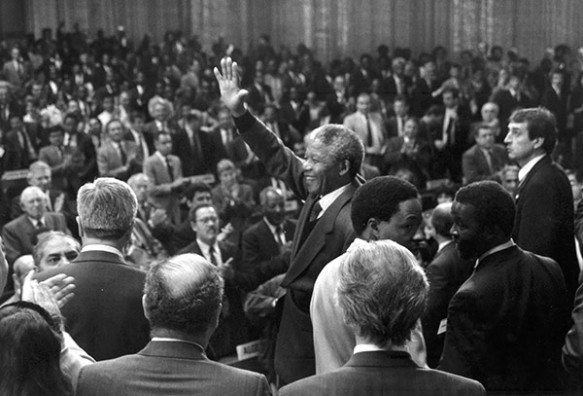
Kiran Mehra-Kerpelman, ILO Head of Campaigns and Advocacy @KiranMehraK
Nelson Mandela (Madiba) left us in December 2013. But his legacy lives on. And we continue to celebrate International Mandela Day on 18 July, his birthday. My first contact with that giant of a man, Nelson Mandela, was at the ILO in Geneva in 1990. I had just joined the organization a few months earlier and Mandela had only recently attained freedom after 27 years of captivity. Can you imagine what I felt when I heard that he was to be a special guest at the International Labour Conference that year?
And by some stroke of luck, perhaps because we were the Bureau of Public Information, I was even able to have a fleeting face-to-face encounter with him, an awe-inspiring moment which still gives me goose bumps when I remember it.
I can clearly recall his words that day: “All of us on Robben Island and other jails could hear your voices demanding our release very clearly. We drew inspiration from this.” He thanked the ILO for its support during those troubled years and for refusing to forget him and other advocates for freedom and equality. Watch Mandela’s address to the 77th International Labour Conference.
21 years later, that is in 2011, when I was posted for five years as Director of the United Nations Information Centre for India and Bhutan (UNIC) in New Delhi, we organized commemorative events on 18th July to celebrate Madiba’s birthday. At one such event, I was humbled and honoured to meet with South African activist Ahmed Kathrada, who was Mandela’s close friend, associate and fellow prisoner at Robben Island prison. Kathrada recalled his days in prison and also described South Africa’s experience of apartheid.
In 2007, the ILO had awarded Mandela with its first-ever Decent Work Prize.
Upon receiving it, he referred to the common values that the ILO shared with South Africa, the importance of decent work, all of which remain relevant even today and merit some reflection. He said that progress could only be possible through genuine dialogue and that the ILO had established the principles of decent work and carved its place in the world.
“Decent work is based on the efforts of personal dignity, on democracies that deliver for people, and economic growth that expands opportunities for productive jobs and enterprise development. Decent work also underpins the principle that the purpose of creating work/wealth is to eradicate poverty,” Mandela said. “[It] is also about the right not only to survive but to prosper and to have a dignified and fulfilling quality of life. This right must be available to all human beings,” he concluded.
On Mandela’s passing in December 2013, ILO Director-General Guy Ryder recalled Mandela’s visit to the ILO and also his acceptance of the Decent Work Award. “We have lost a champion of freedom, of tolerance and of dialogue,” he said, noting in particular Mandela’s pursuit of peace and social justice. “Nelson Mandela was fearless as he stood up for freedom, equity and dignity in the struggle against apartheid.”
Today these values are at the centre of the 2030 Agenda for Sustainable Development and July 18 is a reminder to us all that we must stand up for the most vulnerable and leave no-one behind.


Pingback: Nelson Mandela’s legacy lives on today | MBA Help24